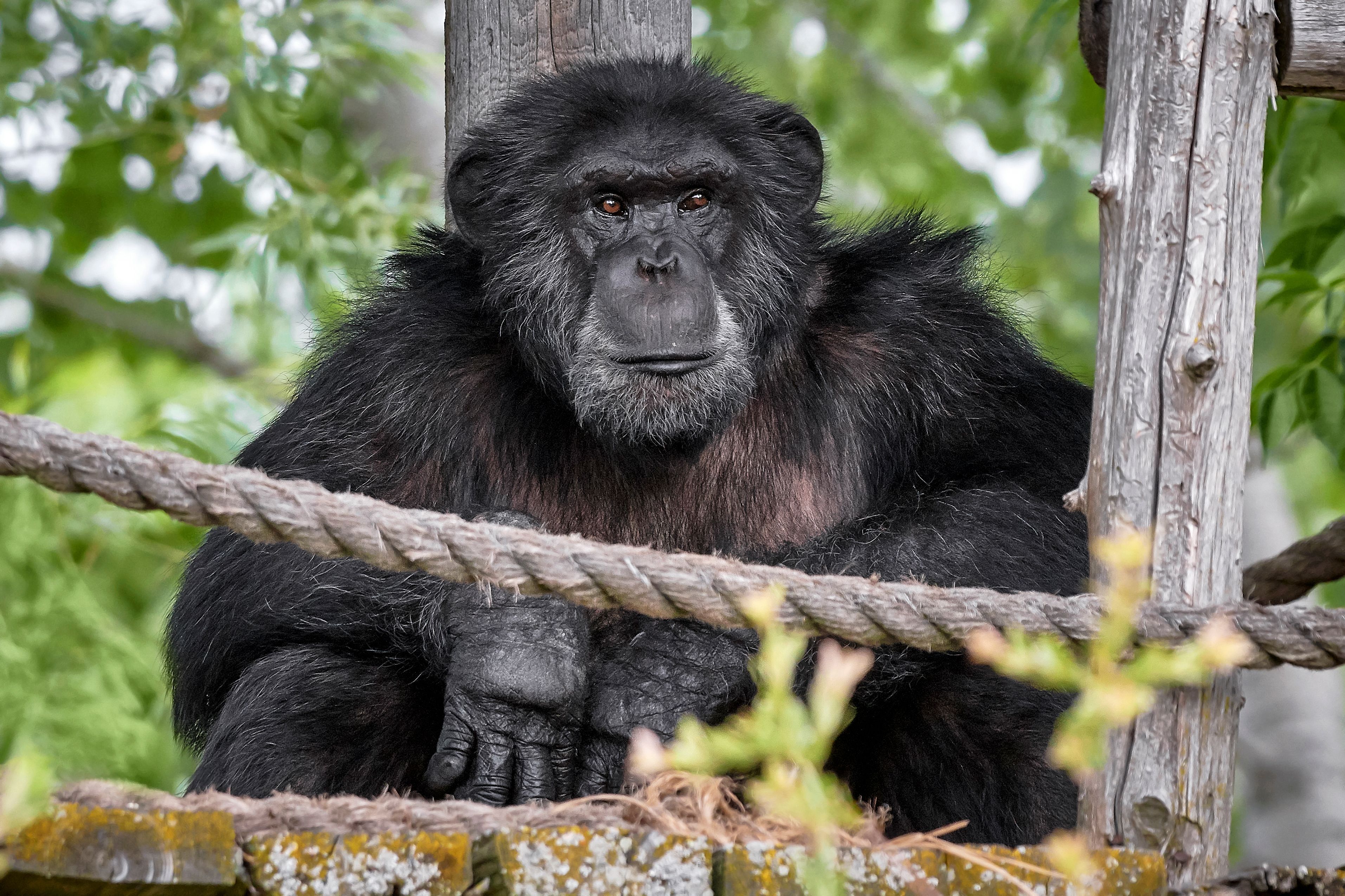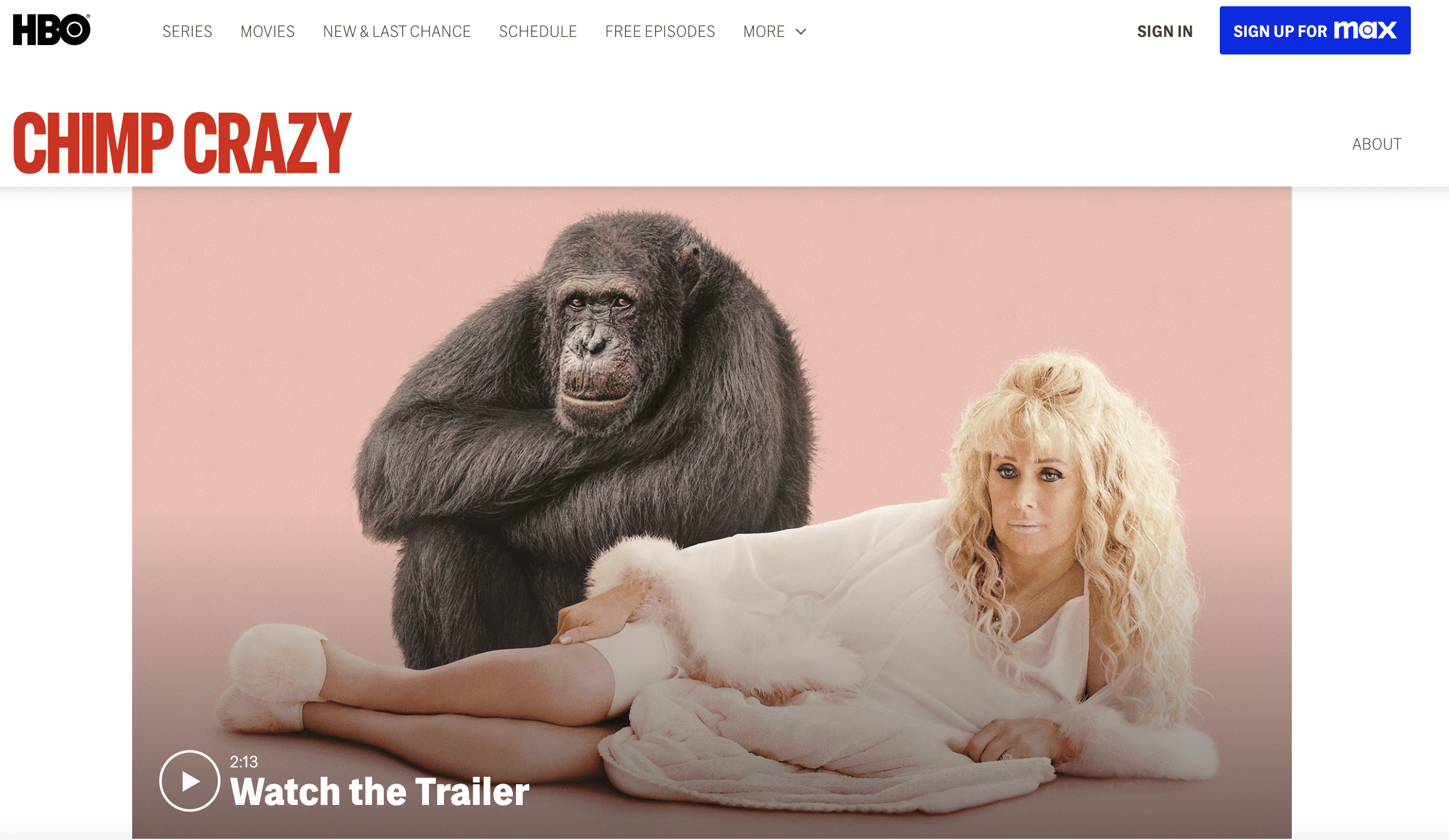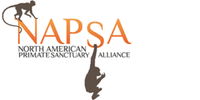A docuseries “Chimp Crazy” will air on HBO Max in the US and Crave in Canada beginning August 18. This 4-part series follows the true story of 4 chimpanzees living as "pets" and what humans have done to them. One of the chimpanzees was Tonka. He and other chimpanzees were part of the case against exotic animal broker Tonia Haddix and the Missouri Primate Foundation and the story is part of the series. Fauna played a small part in the case; our Associate Director, Mary Lee Jensvold, Ph.D. was an expert witness.
Should I watch it?
We encourage our supporters to watch it if you have access to HBOMax in the US or Crave in Canada. The trailer and the Today Show give a little preview. Even though we may find it disturbing, shocking, or providing a platform for individuals who exploit animals, we can harness that to take action.
The series is produced and directed by filmmaker Eric Goode who created the series “Tiger King”. For all its drama, and the little focus on animal welfare, the awareness generated by the Tiger King was instrumental in the passing of The Big Cat Public Safety Act in 2022. It ended the private ownership of big cats as pets and prohibit exhibitors from allowing public contact with big cats, including cubs. We feel the awareness raised in Chimp Crazy may do the same for the Captive Primate Safety Act. This would prohibit private ownership and interstate or foreign commerce of nonhuman primates for the cruel “pet” trade.
If it decidedly turns you off, we encourage you still to educate yourself with resources and ways to take action on this page. In the US, action includes contacting your representative to support the Captive Primate Sanctuary Act. In Canada, there is proposed legislation, Bill S-15, that would ban the commercial trade of elephants and great apes and their use for entertainment purposes. Additionally, captive wildlife facilities would be required to have a permit to keep these species which they only can do when it’s in the best interest of an individual animal or for conservation or research purposes.

Life in a Sanctuary
This docuseries shows life for “pet” primates and the absolutely inappropriate conditions in which they are kept. Would you keep a horse in a high rise apartment? No. Because that apartment can’t provide what horses need, which is open spaces and grazing opportunities. Chimpanzees need everything that the forests of Africa provide, but in the case of those in North America we have to make due with captivity. That captivity should provide for opportunity to engage in natural chimpanzee behaviors such as climbing, swinging, foraging, problem solving, and a rich social life with other chimpanzees and compassionate stable caregivers. This is what happens in accredited sanctuaries.
We will be featuring videos through the coming weeks to show you life for the chimpanzees at Fauna and the ways that it promotes natural chimpanzee behaviors. This page will continue to update with those videos.
Understanding Chimpanzee Behaviors
The first step is to make sure that caregivers understand safety and chimpanzee behaviors. We use a variety of materials including a chimpanzee behavioral taxonomy and ways to use chimpanzee behaviors in caregiving interactions. But first and foremost is to understand the strength and emotional nature of chimpanzees, which means we safety is paramount.
The Sanctuary Morning
At Fauna the chimpanzees' days begin with a breakfast bag individually served to them. While the chimpanzees enjoy breakfast, caregivers clean enclosures and prepare new activities. Environmental enrichment promotes natural chimpanzee behavior and includes, forages, objects, and surprises.
Living Spaces
Enclosures at Fauna are diverse including elevated tunnels, islands, and climbing structures and create space for play, grooming, foraging and other natural chimpanzee behaviors.
Enrichment
Objects and food puzzles promote natural chimpanzee behaviors such as tool use, problem solving, and manual dexterity as well as providing an occupation. A variety of these activities are provided each day to the chimpanzees at Fauna.
Social enrichment
Relationships with other chimpanzees are essential for good well-being. Can you spot grooming and play?
Afternoons
Lunch is served and the afternoon winds down, ending with supper bags and blankets to make a night time nest. Wild chimpanzees build and sleep in nests every night.
How can I watch the series?
The series begins August 18 at 10:00 pm Eastern and there is a new episode each week.
In Canada on Crave.
In the US on HBO Max.
What can I do besides watch?
Learn more and support the Captive Primate Sanctuary Act. Contact your representative.
Support Bill-15. Learn more here and here.
We know this series will generate many questions. Please email your questions to us!
What are people saying about the series?
(Spoiler alert for these links).
LA Times: Seeing ‘Chimp Crazy’ led PETA to urge criminal charges against Tonia Haddix
LA Times: For ‘Chimp Crazy’ director Eric Goode, ‘the end justifies the means’
Rolling Stone: She Faked Her Chimp’s Death. Then Things Went Apeshit.
MSNBC Opinion: 'Chimp Crazy' Only Scratches the Surface of Necessary Primate Protections.
Chicago Tribune: Megan Ross: 'Chimp Crazy' is evidence of why primate protection is so important.





